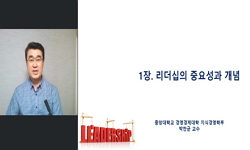In order to address and overcome challenges that higher education institutions confront, it is critical for higher education institutions to embrace and recognize the applicability and implication of knowledge management. The purpose of this study was...
http://chineseinput.net/에서 pinyin(병음)방식으로 중국어를 변환할 수 있습니다.
변환된 중국어를 복사하여 사용하시면 됩니다.
- 中文 을 입력하시려면 zhongwen을 입력하시고 space를누르시면됩니다.
- 北京 을 입력하시려면 beijing을 입력하시고 space를 누르시면 됩니다.
부가정보
다국어 초록 (Multilingual Abstract)
In order to address and overcome challenges that higher education institutions confront, it is critical for higher education institutions to embrace and recognize the applicability and implication of knowledge management. The purpose of this study was to: examine the perceptions of department chairs of the importance of knowledge management strategies. A research question guided this inquiry: how academic department chairs in colleges of education differ in their perceptions of the importance of knowledge management strategies by organizational factors. Data were collected through a web-based survey. Descriptive statistics, t-tests, and analysis of variance based on indices and scales for the importance of knowledge management strategies were examined. Implications for practice and future research were drawn.
참고문헌 (Reference)
1 Davenport, H. T., "Working knowledge: How organizations manage what they know" Harvard Business School Press 1998
2 Dierkes, M., "Visions, technology, and organizational knowledge: An analysis of the interplay between enabling factors and triggers of knowledge generation In: Knowledge management in the innovation process" Kluwer Academic Publishers 9-42, 2001
3 Davis, J. H., "The trusted general manager and business unit outcomes: Empirical evidence of a competitive advantage" 21 (21): 563-376, 2000
4 Strassmann, P. A., "The squandered computer: Evaluating the business alignment of information technologies" Information Economics Press 1997
5 McElroy, M. W., "The new knowledge management: Complexity, learning, and sustainable innovation" Butterworth-Heinemann 2003
6 Seagren, A. T., "The department chair: New roles, responsibilities, and challenges (Higher Education Report No.1). Washington, DC: ASHE-ERIC"
7 Wolverton, M., "The department as double agent: The call for department change and renewal" 22 (22): 203-215, 1998
8 Beckman, T. J., "The current state of knowledge management In: Knowledge management handbook" CRC Press 1-23, 1999
9 Wolverton, M., "The changing nature of the academic deanship" Jossey-Bass 28 (28): 2001
10 Kaplan, R. S., "The balanced score: Translating strategy into action" Harvard Business School Press 1996
1 Davenport, H. T., "Working knowledge: How organizations manage what they know" Harvard Business School Press 1998
2 Dierkes, M., "Visions, technology, and organizational knowledge: An analysis of the interplay between enabling factors and triggers of knowledge generation In: Knowledge management in the innovation process" Kluwer Academic Publishers 9-42, 2001
3 Davis, J. H., "The trusted general manager and business unit outcomes: Empirical evidence of a competitive advantage" 21 (21): 563-376, 2000
4 Strassmann, P. A., "The squandered computer: Evaluating the business alignment of information technologies" Information Economics Press 1997
5 McElroy, M. W., "The new knowledge management: Complexity, learning, and sustainable innovation" Butterworth-Heinemann 2003
6 Seagren, A. T., "The department chair: New roles, responsibilities, and challenges (Higher Education Report No.1). Washington, DC: ASHE-ERIC"
7 Wolverton, M., "The department as double agent: The call for department change and renewal" 22 (22): 203-215, 1998
8 Beckman, T. J., "The current state of knowledge management In: Knowledge management handbook" CRC Press 1-23, 1999
9 Wolverton, M., "The changing nature of the academic deanship" Jossey-Bass 28 (28): 2001
10 Kaplan, R. S., "The balanced score: Translating strategy into action" Harvard Business School Press 1996
11 Lam, W., "Successful knowledge management requires a knowledge culture: A case study" 3 (3): 206-217, 2005
12 Davenport, H. T., "Successful knowledge management projects" 39 (39): 43-57, 1998
13 Rowley, D. J., "Strategic change in colleges and universities" Jossey-Bass Publishers 1997
14 Pavitt, K., "Some foundations for a theory of the large innovating firm In: Technology and enterprise in a historical perspective" Oxford University Press 212-228, 1992
15 Desouza, K. C., "Securing knowledge in organizations In: New frontiers of knowledge management" Palgrave/Macmillan 76-98, 2005
16 Leslie, L. L., "Rising administrative costs: Seeking explanations" 66 (66): 187-122, 1995
17 Nunnally, J. C., "Psychometric theory" McGraw-Hill 1994
18 Chaudhry, A. S., "Perspectives on education for knowledge management. In 67th IFLA Council and General Conference, Boston, MA, August. 16-25. Retrieved July 29, 2006, from http://www.ifla.org/IV/ifla67/papers/036-115ae.pdf"
19 Roth, G. L., "Perceptions of occupational education deans regarding the uses of information technologies for instruction" 11 (11): 203-213, 1989
20 Serban, A. M,, "Overview of knowledge management In: Knowledge management: Building a competitive advantage in higher education (pp.5-16). New Directions for Institutional Research, No.113" Jossey-Bass 2002
21 Fiol, C. M., "Organizing for knowledge-based competitiveness: About pipelines and rivers In: Managing knowledge for sustained competitive advantage: Designing strategies for effective human resource management" Jossey-Bass 64-94, 2003
22 Brown, J. S., "Organizational learning and communities of practice: Toward a unified view of working, learning, and innovation" 2 (2): 40-57, 1991
23 Alvesson, M., "Odd couple: Making sense of the curious concept of knowledge management" 38 (38): 995-1018, 2001
24 Abrams, L. C., "Nurturing interpersonal trust in knowledge-sharing network" 17 (17): 64-77, 2003
25 Skyrme, D. J., "New measures of success" 19 (19): 20-24, 1998
26 Boudreau, J. W., "Managing knowledge for sustained competitive advantage: Designing strategies for effective human resource management" Jossey-Bass 360-396, 2003
27 Smith, H. A., "Making knowledge work: Five principles for action-oriented knowledge management" 4 (4): 116-124, 2006
28 Dillman, D. A., "Mail and internet surveys: The tailored design method" John Wiley & Sons 2000
29 Hawkins, B., "Libraries, knowledge management, and higher education in an electronic environment. Australian Library Information Association (ALIA) Conference on Capitalising on knowledge: The information profession in the 21st century (Canberra, Australia, October 23-26, 2000). Retrieved August 15, 2006, from http://conferences.alia.org.au/alia2000/proceedings/brian.hawkins.html"
30 Nam, C. H., "Leaders and champions for construction innovation" 15 (15): 259-270, 1997
31 Skyrme, D. J., "Knowledge networking: Creating the collaborative enterprise" Plant A Tree 1999
32 Gold, A. H., "Knowledge management: an organizational capabilities perspective" 18 (18): 185-214, 2001
33 Reardon, D. F., "Knowledge management: The discipline for information and library science professionals. 64th IFLA General Conference. Retrieved July 29, 2006, from http://www.ifla.org/IV/ifla64/017-123e.htm"
34 Coakes, E., "Knowledge management in the sociotechnical world: The graffiti continues" Springer 2002
35 Thorn, C. A., "Knowledge management for educational information systems: What is the state of the field? Educational Policy Studies Archives. Retrieved August 20, 2005, from http://epaa.asu.edu/epaa/v9n47"
36 Freeze, R., "Knowledge management capability assessment: Validating a knowledge assets measurement instrument. Proceedings of the 38th Hawaii International Conference on System Sciences. Retrieved August 27, 2006, from http://csdl2.computer.org/comp/proceedings/hicss/2005/2268/08/22680251a.pdf"
37 Metcalfe, A. S., "Knowledge management and higher education: A critical analysis" Idea Group Publishing 2006
38 Burton-Jones, A., "Knowledge capitalism: Business, work, and learning in the new economy" Oxford University Press 2001
39 Pfeffer, J., "Knowing what to do is not enough: Turning knowledge into action" 42 (42): 83-91, 1999
40 Rowley, J., "Is higher education ready for knowledge management?" 14 (14): 325-332, 2000
41 Wolfe, D. A., "Investing knowledge in universities: Rethinking the firm’s role in knowledge transfer In: Knowledge management in the innovation process" Kluwer Academic Publisher 173-191, 2001
42 Ary, D., "Introduction to research in education" Harcourt Brace College Publishers 1996
43 Wiig, K. M., "Introducing knowledge management into the enterprise In: Knowledge management handbook" CRC Press 1-23, 1999
44 Jeris, L. S., "Intervening for transformation: An organizational learning perspective. Retrieved January 16, 2007, from http://www.eric.ed.gov/ERICDocs/data/ericdocs2/content_storage_01/0000000b/80/25/c5/5d.pdf"
45 Baek, S., "Intelligent agents for knowledge management: Toward intelligent web-based collaboration within virtual team In: Knowledge management handbook" CRC Press 1-23, 1999
46 Hurley, R. F., "Innovation, market orientation, and organizational learning: Integration and empirical examination" 62 (62): 42-54, 1998
47 Amidon, D. M., "Innovation strategy for the knowledge economy: The Ken awakening" Butterworth-Heinemann 1997
48 Roth, G. L., "Information technology and workplace learning" 68 : 75-85, 1995
49 Dakhli, D., "Human capital, social capital, and innovation: A젨젨젨젨젨젨 multi-country study" 16 (16): 107-128, 2004
50 Goddard, A., "Facing up to market forces" 13 (13): 1998
51 Roberts, S. A., "Electronic journals in higher education: Technology, decisionmaking, and economics" 21 (21): 223-234, 2001
52 Kermally, S., "Effective knowledge management: A best practice blueprint" Jon Wiley & Sons 2002
53 Koenig, M. E. D., "Education for knowledge management" 19 (19): 17-31, 1999
54 Field, A., "Discovering statistics using SPSS" SagePublications 2005
55 De Long D. W., "Diagnosing cultural barriers to knowledge management" 14 (14): 113-127, 2000
56 Carrol, J. B., "Department chair’s perceptions of the importance of their duties" 10 (10): 49-63, 1994
57 Sackman, S. A, "Cultural knowledge in organizations" Sage Publications 1991
58 Sackman, S. A., "Cultural complexity in organizations: Inherent contrasts and contradictions" Sage Publications 1997
59 Thomson, G., "Changing universities: From evolution to revolution In: Facing up to radical changes in universities and colleges" Kogan Page 1-8, 1997
60 Gmelch, W. H., "Chairing an academic department" Sage Publications 1995
61 Gmelch, W. H., "Becomingadepartmentchair:Negotiating the transition from scholar to administrator. Paper presented at the Annual Meeting of the American Educational Research Association (Montreal, Ontario, April 19-23). Retrieved August 14, 2006, from http://www.eric.ed.gov/ERICDocs/data/ericdocs2/content_storage_01/0000000b/80/11/7e/62.pdf"
62 Tetrick, L. E., "Assessing the culture and climate for organizational?learning In: Managing knowledge for sustained competitive advantage: Designing strategies for effective human resource management" Jossey-Bass 333-359, 2003
63 Kidwell, J. J., "Applying corporate knowledge management practices in higher education" 23 (23): 28-33, 2000
64 Kelly, S., "Academic performance evaluation and the organization of knowledge in the research-intensive university" 95-109, 2005
65 Ruth, S., "A university-based approach to the diffusion of knowledge management concepts and practices. SIGPR, New Orleans, LA. Retrieved April 29, 2006, from http://icasit.org/finalkmpaper.htm"
66 Spec, R. van der, "A survey on good practices in knowledge management in European companies In: Knowledge management: Concept and best practices" Springer 191-206, 2003
67 Gumport, P. J., "A case of bureaucratic accretion: Context and consequences" 66 (66): 493-520, 1995
동일학술지(권/호) 다른 논문
-
- 한국성인교육학회
- 최영준
- 2008
- KCI등재
-
자아창조와 공적연대를 지향하는 폐기학습 모델에 관한 연구
- 한국성인교육학회
- 송미영
- 2008
- KCI등재
-
대졸 초기경력자의 조직적응에 관한 질적 연구: 이직고려사유와 이에 대한 대응실태를 중심으로
- 한국성인교육학회
- 장서영
- 2008
- KCI등재
-
- 한국성인교육학회
- 원영희
- 2008
- KCI등재
분석정보
인용정보 인용지수 설명보기
학술지 이력
| 연월일 | 이력구분 | 이력상세 | 등재구분 |
|---|---|---|---|
| 2027 | 평가예정 | 재인증평가 신청대상 (재인증) | |
| 2021-01-01 | 평가 | 등재학술지 유지 (재인증) |  |
| 2018-01-01 | 평가 | 등재학술지 유지 (등재유지) |  |
| 2015-01-01 | 평가 | 등재학술지 유지 (등재유지) |  |
| 2011-01-01 | 평가 | 등재학술지 유지 (등재유지) |  |
| 2009-01-01 | 평가 | 등재학술지 유지 (등재유지) |  |
| 2007-01-01 | 평가 | 등재학술지 유지 (등재유지) |  |
| 2004-01-01 | 평가 | 등재학술지 선정 (등재후보2차) |  |
| 2003-01-01 | 평가 | 등재후보 1차 PASS (등재후보1차) |  |
| 2001-07-01 | 평가 | 등재후보학술지 선정 (신규평가) |  |
학술지 인용정보
| 기준연도 | WOS-KCI 통합IF(2년) | KCIF(2년) | KCIF(3년) |
|---|---|---|---|
| 2016 | 1.56 | 1.56 | 1.63 |
| KCIF(4년) | KCIF(5년) | 중심성지수(3년) | 즉시성지수 |
| 1.64 | 1.54 | 1.977 | 0.08 |
연관 공개강의(KOCW)
-

재난관리 리더십과 재난대응 협업 (Disaster Management Leadership and Collaboration for Disaster Response)
K-MOOC 국가민방위재난안전교육원 NDTI International Cooperation Team -

재난관리 리더십과 재난대응 협업 (Disaster Management Leadership and Collaboration for Disaster Response)
K-MOOC 국가민방위재난안전교육원 NDTI International Cooperation Team -

지식경영
충북대학교 김상욱 -

리더십
중앙대학교 박찬균 -

리더십의 이해
경성대학교 송이재




 스콜라
스콜라

